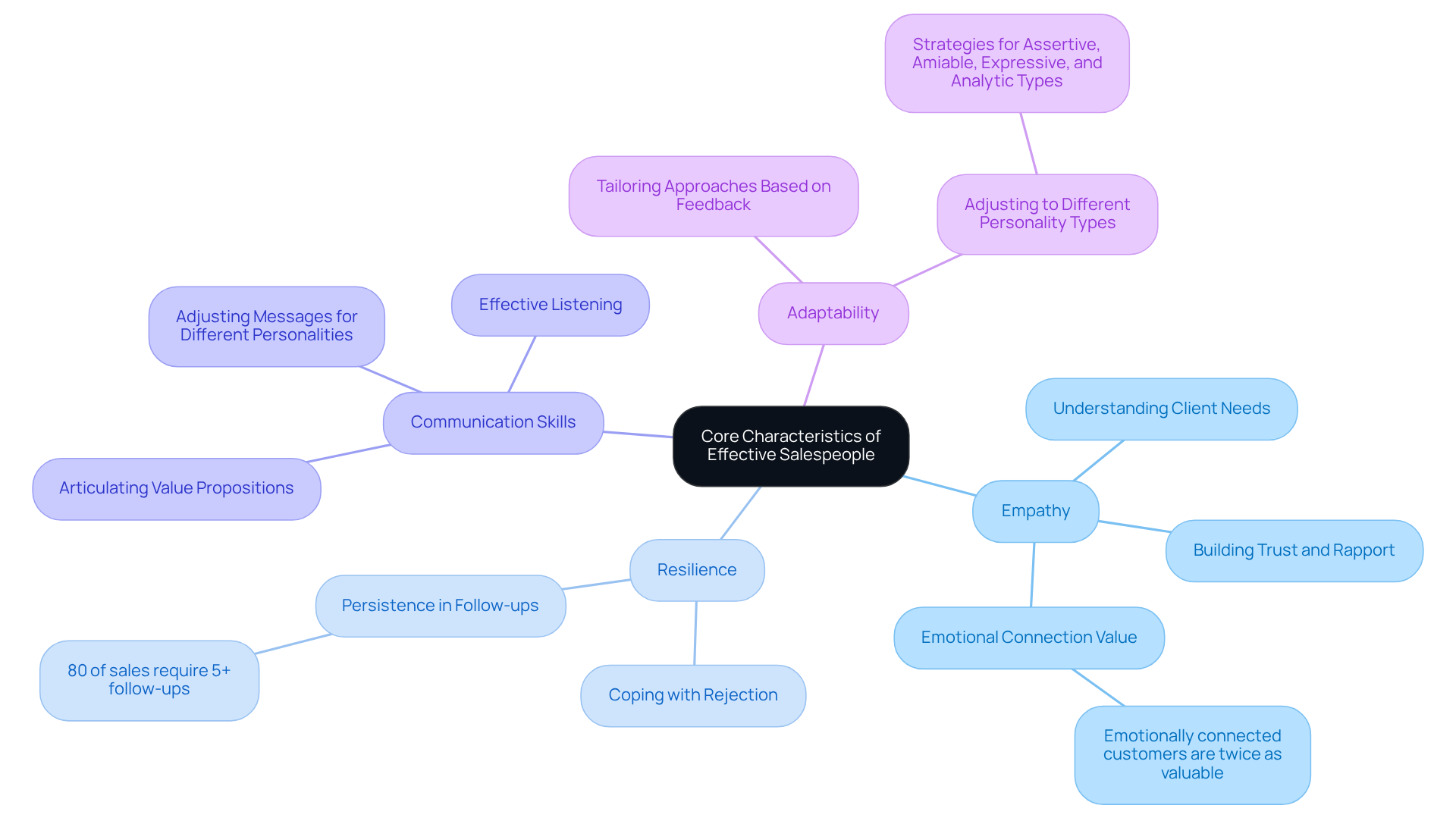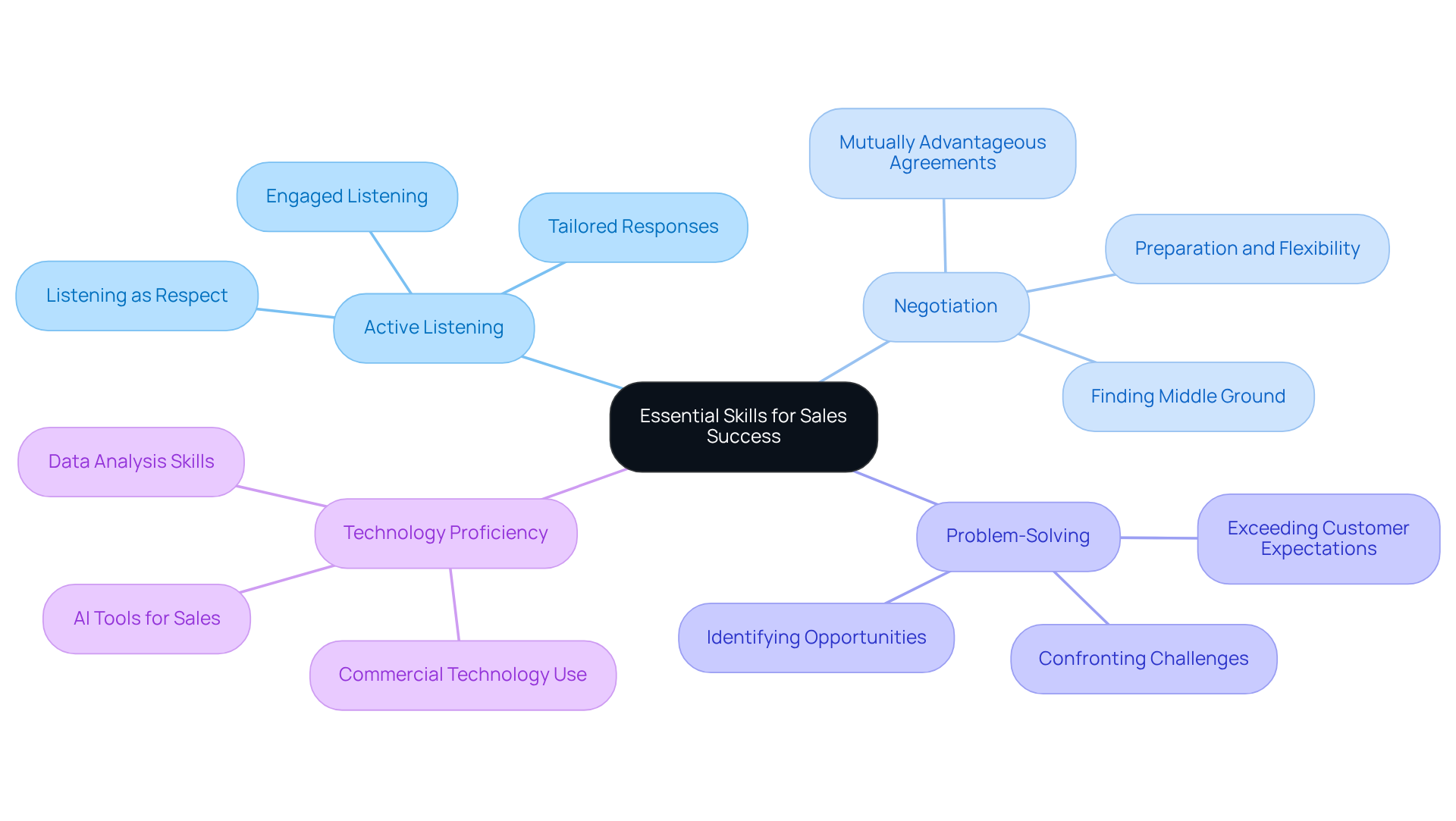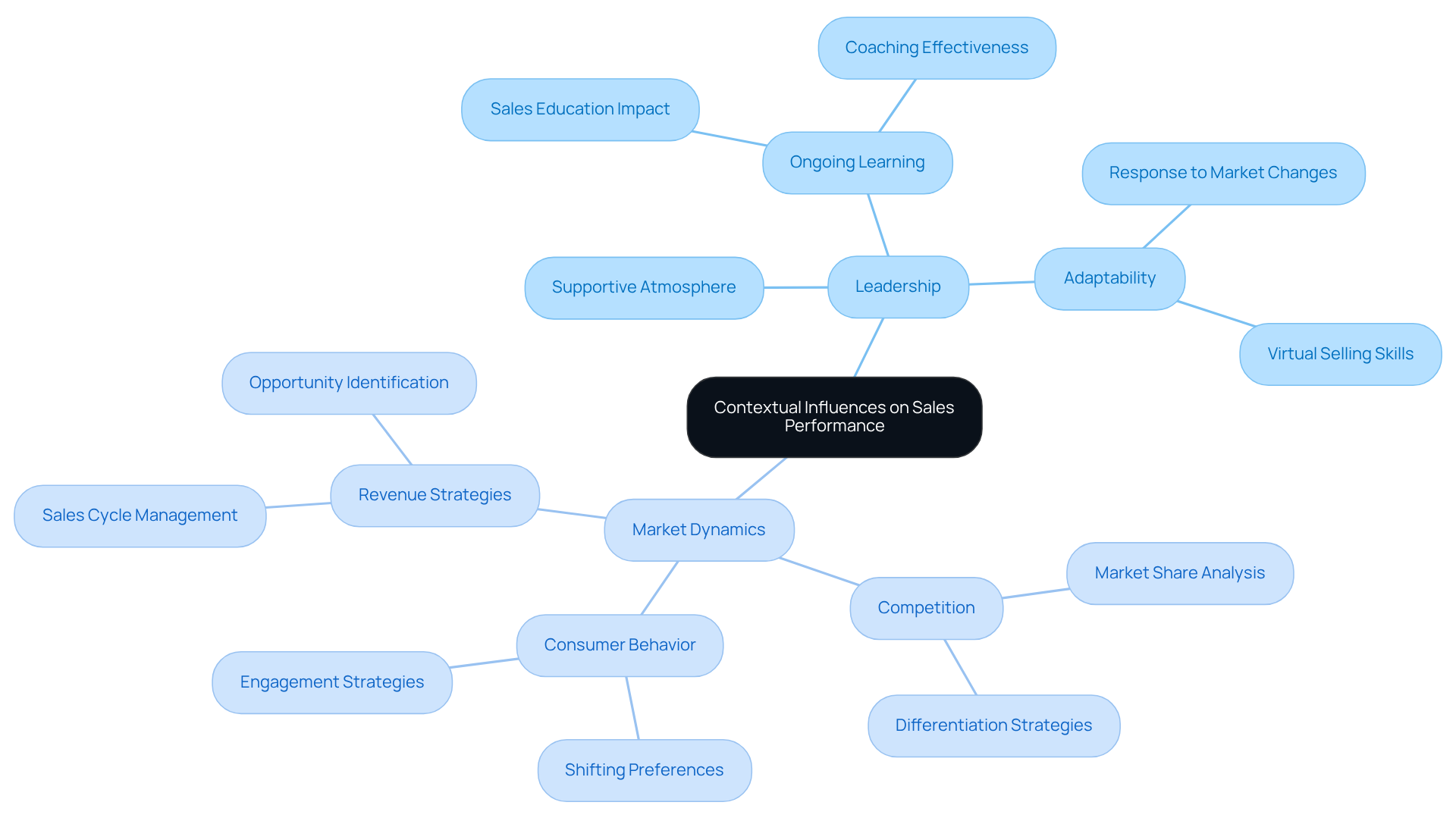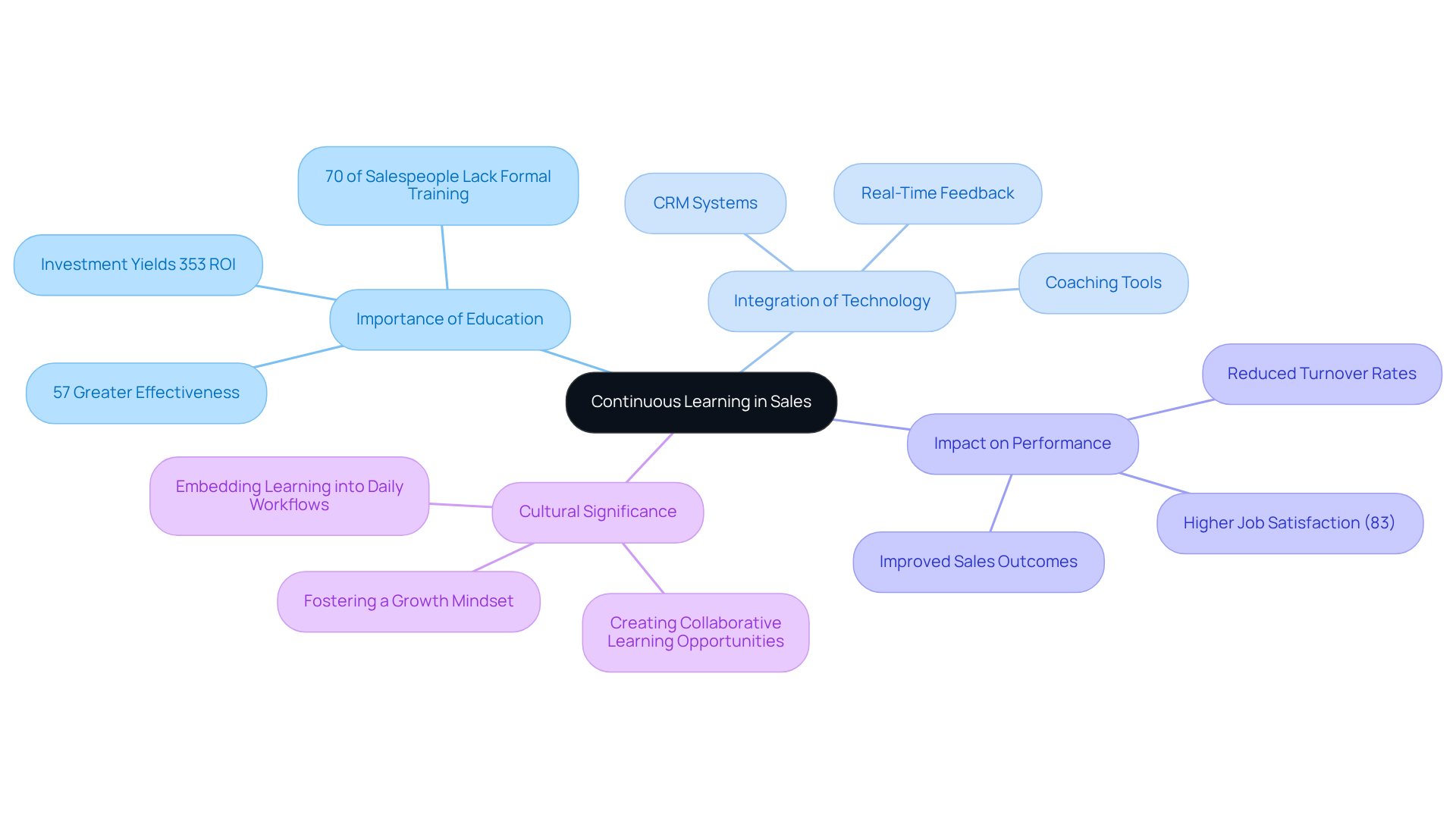
Overview
Effective salespeople are characterized by essential traits such as empathy, resilience, strong communication skills, and adaptability. These qualities empower them to forge meaningful connections with clients and adeptly navigate challenges encountered in the sales process.
This article substantiates these claims by illustrating how these characteristics not only cultivate trust and rapport with clients but also significantly enhance overall sales performance. This is achieved through tailored engagement and unwavering perseverance in follow-ups, ultimately driving successful outcomes.
Introduction
Effective salespeople are not merely born; they are meticulously crafted through a unique blend of traits and skills that empower them to excel in competitive environments. By understanding the core characteristics that define these professionals—such as empathy, resilience, and adaptability—we can unlock the potential for greater sales success. Yet, amidst the ever-evolving market dynamics and the imperative for continuous learning, what truly distinguishes the top performers from their peers? This article delves into the essential traits and skills that underpin effective salesmanship, exploring how these individuals navigate challenges and seize opportunities in today's fast-paced commercial landscape.
Defining Effective Salespeople: Core Characteristics
Effective salespeople possess a distinctive combination of traits that empower them to build relationships with clients and successfully close deals. Among these, empathy stands out as an essential trait, allowing professionals to comprehend and connect with their clients' needs, thus promoting trust and rapport. Research indicates that emotionally connected clients are more than twice as valuable as those who are simply satisfied, underscoring the significance of empathy in driving sales success. As Daniel Leemon notes, these emotionally connected customers buy more, visit more often, and recommend brands more, emphasizing the substantial impact of emotional connections on purchasing behavior.
Resilience is another essential characteristic, enabling individuals in sales to cope with the unavoidable rejections and setbacks they face. Resilient individuals maintain their motivation and focus, viewing challenges as opportunities for growth. This persistence is crucial, as research indicates that 80% of successful transactions require five or more follow-up calls, yet many representatives give up after just four attempts.
Robust communication abilities are equally crucial, as they allow professionals to express value propositions clearly and convincingly. Skilled communicators can adjust their messages to resonate with various personality types, enhancing their capacity to connect with a diverse audience. A positive mindset, combined with a sincere conviction in the product or service being offered, further strengthens the foundation for commercial success.
Adaptability is also vital, as salespeople need to adjust their approaches based on customer feedback and personality types. The four distinct personality types—Assertive, Amiable, Expressive, and Analytic—each necessitate customized strategies for effective engagement.
In effective selling groups, these characteristics manifest in different forms. For instance, empathetic salespeople often engage in active listening, enabling them to discover client pain points and provide tailored solutions. Resilience is reflected in the way salespeople approach follow-ups and nurture leads, ensuring that they remain engaged with potential clients over time. Together, these traits generate a powerful synergy that enhances and fosters long-term client relationships.

Essential Skills for Sales Success: What Salespeople Need to Excel
To excel in sales, salespeople must cultivate a range of essential skills that are critical to their success.
- Active listening, negotiation, and problem-solving abilities form the cornerstone of effective strategies employed by salespeople.
- Engaged listening empowers salespeople to fully comprehend client issues, allowing for tailored responses that resonate with customer needs.
- Furthermore, negotiation skills are indispensable for salespeople in securing mutually advantageous agreements.
- enable salespeople to confront challenges head-on, delivering solutions that not only meet but exceed customer expectations.
- Additionally, proficiency in commercial technology and data analysis significantly enhances the performance of salespeople.
- By leveraging these tools, salespeople can monitor leads and evaluate their efficiency in real-time, ultimately driving better results.

Contextual Influences on Sales Performance: Leadership and Market Dynamics
Sales performance is profoundly shaped by contextual factors such as leadership and market dynamics. Effective leadership cultivates a supportive atmosphere that encourages teamwork and creativity among sales groups. Leaders who prioritize education and development empower their sales staff to enhance their skills and adapt to evolving market conditions. For instance, organizations with efficient sales education are 2.2 times more likely to promote ongoing learning, a critical component for sustaining a competitive advantage. Furthermore, professionals in organizations with effective training are 1.9 times more likely to engage in virtual instructor-led training, underscoring the importance of adaptability in marketing strategies.
Market dynamics, including competition and shifting consumer behavior, significantly influence revenue strategies. Salespeople must remain to these changes, leveraging data and insights to refine their approaches. Notably, 77% of companies report enhanced revenue performance due to effective coaching, highlighting the necessity of adjusting strategies to meet market demands. Additionally, 44% of revenue leaders indicate an increase in opportunities lost to indecision, emphasizing the urgency for teams to understand market dynamics.
In today's environment, salespeople who focus on client needs and desires are more likely to succeed, as evidenced by the top 20% of professionals who prioritize these elements. As Miles Kingston asserts, "Knowledge of these factors enables both responsive and proactive planning, essential for maintaining relevance in a volatile market." By aligning their strategies with market insights, commercial teams can navigate complexities and drive sustainable growth.

The Importance of Continuous Learning and Adaptation in Sales
In the dynamic landscape of commerce, a commitment to continuous learning and adaptation is essential for success. Salespeople must remain alert to industry trends, emerging technologies, and evolving consumer preferences. Regular practice sessions, workshops, and mentorship opportunities are vital for enhancing skills and knowledge. Notably, organizations that prioritize robust sales education programs achieve 57% greater effectiveness than their competitors, underscoring the direct correlation between investment in development and performance. As Brendan Connaughton asserts, 'Sales coaching is a vital differentiator, with 70% of salespeople lacking formal instruction,' highlighting a significant gap in sales growth that organizations must address.
Adapting to new marketing methodologies and tools, including CRM systems and data analytics platforms, can markedly improve efficiency and effectiveness. By embracing continuous learning, professionals not only elevate their performance but also position themselves as invaluable assets to their organizations. Furthermore, technology such as CRM and coaching tools can enhance the education of salespeople by optimizing data management, strengthening customer relationships, and providing real-time feedback and targeted skill development.
Moreover, the integration of technology into development processes facilitates customized learning experiences, enabling commercial teams to swiftly respond to market changes. For instance, organizations that weave learning into daily operations can enhance team skills without depending on quarterly training sessions. This proactive approach fosters a and resilience, empowering teams to thrive in an ever-evolving marketplace. Additionally, employees at organizations that invest in learning resources are 83% more likely to report increased job satisfaction, reinforcing the significance of tailored development strategies. Continuous training is imperative, particularly given that 84% of sales training content is forgotten within three months, highlighting the necessity for regular reinforcement.

Conclusion
Effective salespeople are distinguished by a unique blend of traits and skills that empower them to forge strong connections with clients and achieve remarkable sales outcomes. Central to their success is the ability to empathize with customers, demonstrating a genuine understanding of their needs and fostering trust. This emotional connection not only enhances client loyalty but also significantly boosts sales performance, underscoring the critical role of empathy in the sales process.
The article elaborates on several key characteristics that contribute to sales effectiveness, including:
- Resilience
- Communication skills
- Adaptability
Resilience enables sales professionals to navigate challenges and persist through rejections, while robust communication skills allow them to articulate value propositions effectively. Moreover, the capacity to adapt strategies based on customer feedback and personality types is essential for engaging diverse clients. Continuous learning and the integration of technology further empower salespeople to stay ahead in a rapidly changing market.
Ultimately, the landscape of sales is shaped by both individual capabilities and external factors such as leadership and market dynamics. Organizations that prioritize ongoing education and foster a culture of adaptability will see their sales teams thrive. By investing in the development of essential traits and skills, as well as understanding the influences of leadership and market changes, sales professionals can position themselves for sustained success. Embracing these principles is not just beneficial; it is crucial for anyone seeking to excel in the competitive world of sales.
Frequently Asked Questions
What are the core characteristics of effective salespeople?
Effective salespeople possess traits such as empathy, resilience, robust communication abilities, a positive mindset, and adaptability.
Why is empathy important in sales?
Empathy allows sales professionals to understand and connect with their clients' needs, promoting trust and rapport. Emotionally connected clients are more valuable, as they tend to buy more, visit more often, and recommend brands.
How does resilience benefit salespeople?
Resilience helps salespeople cope with rejections and setbacks, maintaining their motivation and focus. This persistence is crucial, as many successful transactions require multiple follow-up calls, and resilient individuals are more likely to continue after initial challenges.
What role do communication skills play in sales?
Strong communication abilities enable salespeople to express value propositions clearly and convincingly. Skilled communicators can tailor their messages to resonate with different personality types, enhancing their effectiveness in connecting with diverse audiences.
How does adaptability impact a salesperson's success?
Adaptability allows salespeople to modify their approaches based on customer feedback and personality types, ensuring they engage effectively with clients.
What are the four distinct personality types that salespeople should consider?
The four personality types are Assertive, Amiable, Expressive, and Analytic. Each type requires customized strategies for effective engagement.
How do these characteristics manifest in effective selling groups?
Empathetic salespeople engage in active listening to discover client pain points, while resilience is shown in their follow-up strategies. Together, these traits enhance revenue performance and foster long-term client relationships.
FAQs











